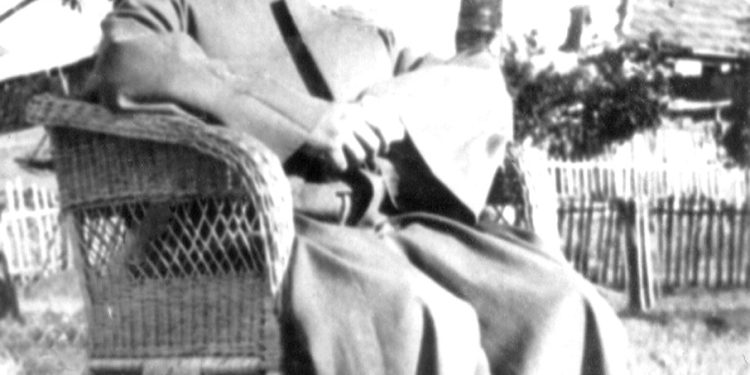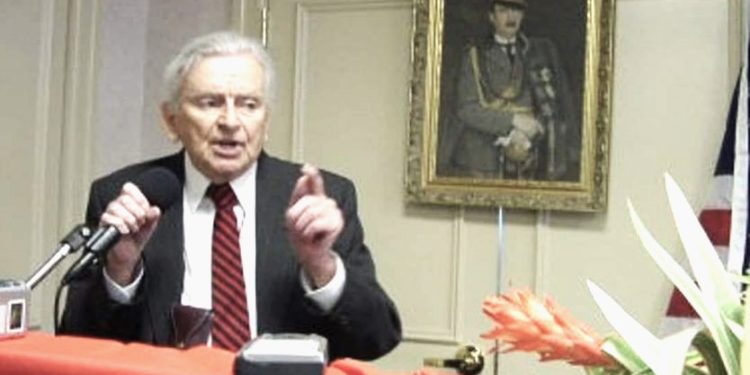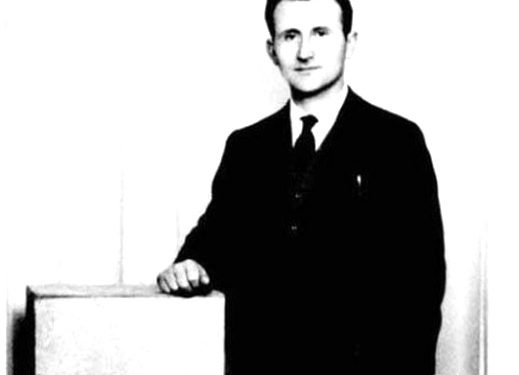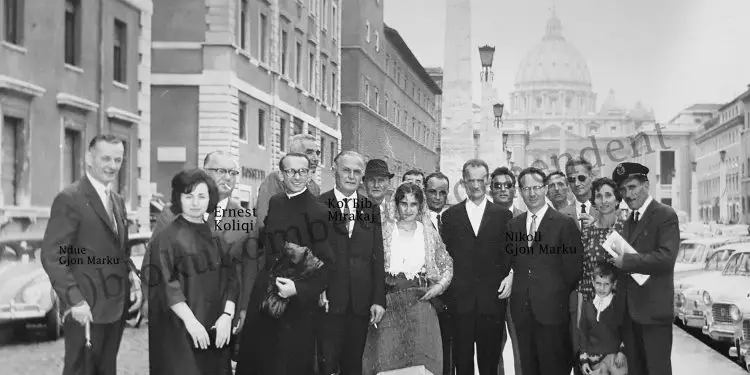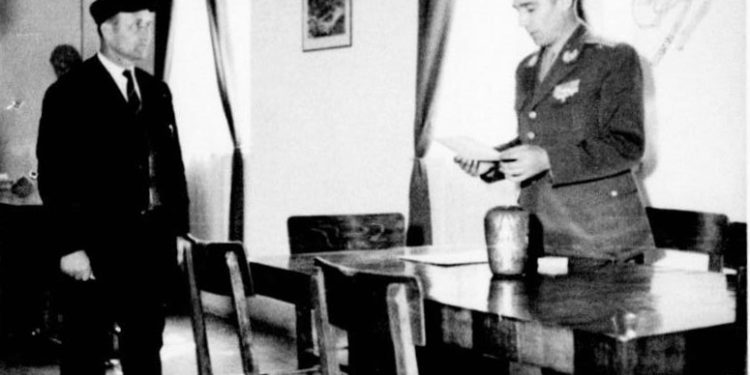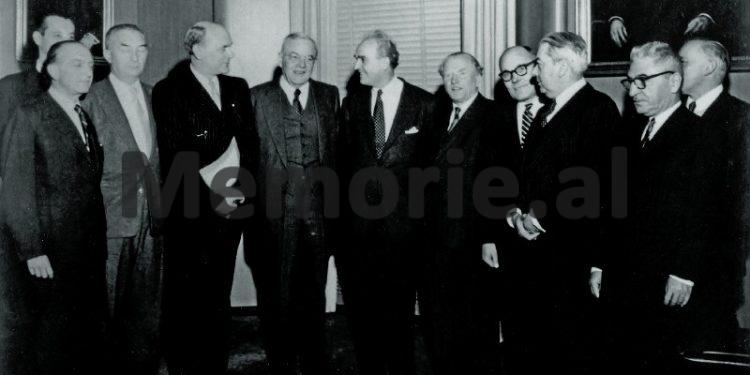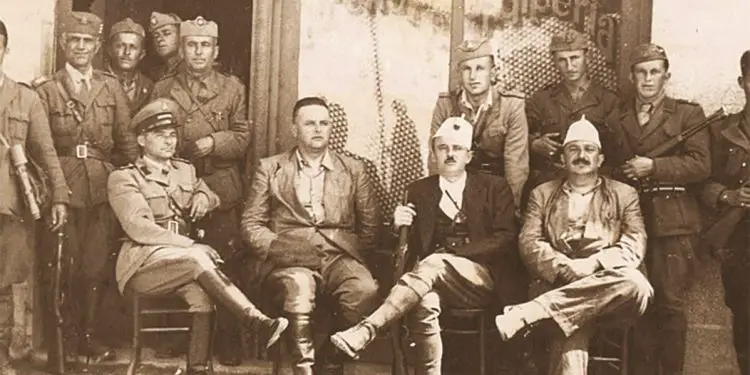By Dalip Greca
Memorie.al / In this exclusive interview for the newspaper “Dielli,” Dr. Fuad Myftia, son of the well-known cleric Sali Myftia from the city of Shkodër, who in November 1944, along with many nationalist leaders of the “Balli Kombëtar” and the Legality Movement, was forced to flee Albania due to the fact that the communist partisan forces of Enver Hoxha were taking control of the entire country and the power after the Germans left. In this interview, Dr. Fuad Myftia recounts his entire political activity and the activities of the Legality Movement from 1945 until 1990, as well as the period when that party returned to Albania after the fall of communism.
– “But when did Fuadi come to America?” – I ask the interlocutor.
– “That is another troublesome adventure,” says Fuadi, who continues to detail the story of his life: “I came to America in 1958 because the American office in Greece had closed. My father was still in Alexandria. I was married and wanted to bring my father to stay with us for a while. They gave him a visa for 24 hours, and he stayed with us in Greece for two weeks. After that, he went back to Egypt. The time had come for my wife and me to travel to America. I had two options: either to go by plane or by the ship “Constitution,” which was convenient for that time.
However, we wanted to go to Italy to visit my wife’s relatives since our daughter had been born. We had neither passports nor any kind of documents. I was traveling with a letter given to me by the American office. For the baby, when she was born, we were given a visa on a piece of paper. We went to the Italian consulate for a visa because there was a ship departing for Genoa on the weekend, and after two weeks, that same ship would travel to America. Again, trouble; when I got there, they told me that at the moment, there was no possibility, but we would seek authorization from Rome, which would take about 5-6 weeks. I had no time; the ship was set to leave in 5-6 days. This difficult situation was resolved by Ernest Koliqi, whom I called. The intervention reached somewhere high, up to Andreoti. Ernest had strong friends in the Italian government. The next day I went to the consulate for a visa. The consul, who was not pleased that I had knocked at the door of someone far above, asked me, “What friends do you have in Rome, because we’ve received an emergency telegram from there?”
– I got the visas and we went to Italy. After 15 days, we set sail on that same ship from Genoa to Barcelona, then to Lisbon, and from Lisbon to Cannes. We met King Zog and Queen Germaine. The prince was in Switzerland. The ship stayed three days in Cannes. After three days, it sailed directly to New York. The trip was extremely long, and we were with a small child, and the difficulties multiplied. We traveled a total of 15 days.
How did State Security penetrate the ranks of the legalists?
State Security has always fought to divide nationalist organizations and insert its agents among them. Fuadi believes that some of them passed through Belgrade and revealed themselves with disruptive activities, and even today some continue to act against the interests of the monarchists. Some have been “gifts” from State Security and have infiltrated from Athens.
Some were discovered by chance, while others were revealed and expelled from the Party, and some have remained undiscovered, but not without attracting attention. I ask about the most notorious case, that of the agent Cufe Mullaji, who managed to hold positions up to the Central Committee of the legalists, after he also held the position of number one among the legalists in Belgium, the largest branch of the monarchists in Europe. – “Cufa,” Fuadi recalls, “came in from Greece and stayed for some time in the Lavrios camp, where I was.”
– “When did you discover Cufe as an agent of State Security?” I ask Fuadi.
– “We were not able to discover him; we never thought that he was an agent. Others revealed him. Later, I supported him, I put him in contact with our friends in Brussels.”
– “How did the State Security agent present himself to you? Do you remember the beginning of your introduction to him?”
– “When Cufa came, I was in Greece at that time. It was 1956. The Greeks did the interviews and then took them to the Lavrios camp. Then they would come to see us there and give us some news about Albania. Just like everyone else, Cufa came as well. He introduced himself. The craftsmen had calculated his role well; he was trustworthy, as his father had been a captain for King Zog. He told me, ‘I am so-and-so, I sympathize with the Legality Movement, but I am with Hasan Dosti. From now on, I will be without a party, and I will try to contribute to the Albanian diaspora. I am ready to cooperate with you.’
These were his first words. At first, he behaved like a lamb. We even helped him financially and found him a job. He worked as a liaison with Athens, where he would go and return, making phone calls. As you can see now, he could barely maintain that position since he was free to report to Security. He often even visited our home. To be honest, the first one to doubt him as a suspicious person was my wife. She often told me, ‘What’s wrong with this man; he’s always anxious. He looks anxious. Have you seen how he moves his feet, how his hands tremble when he takes the coffee cup?!’
– “He must be nervous,” I would say. She insisted on her opinion: he is very nervous. He must have problems. – This happened because he was always second in his own self; he was a legalist, a nationalist, the role he played, and the real one, the agent of Security. The first time he emigrated to Belgium, he wanted to register with the Legality Movement. ‘Now,’ he told us, ‘I realize I need to register with the Legality Movement since I am going to Belgium. If I had registered earlier, you would say I was doing it for opportunism, meaning that I had your need. Now I no longer need it; I am on my way to Belgium; I believe you cannot say I’m doing it for opportunism.’
I told him that there was no need for that here. We have a branch there. To register in Belgium. I didn’t know at the time, but it was a principle that the branch there should accept him. Still, Cufa managed to achieve his goal. He became the head of the largest branch, that of Belgium. Later, he also managed to be elected to the Central Committee of the Organization.
– Do you think Cufa controlled everything in your ranks?
– “I don’t think we had any major secrets, but it is a fact that he fed off all the information that was available to the members of the Central Committee, our leadership. At that time, I was the Secretary of the Committee and corresponded with all branches in the outside world. There were 19 branches, and among the most active were the branches of Waterbury, Detroit, Canada, and Belgium.
When the first Congress of the Legality Movement was held, he was elected a member of the Central Committee under the leadership of Nuçi Kota as the General Secretary. So, he received monthly information about everything, and I believe he pleased his own network in Tirana.”
– But when did you learn the truth?
– “Doubts had long been evident. We sent two friends to Belgium, supposedly to study the history of the diaspora, and I also gave them a recommendation to help them. Since they stayed for a long time and didn’t let him out of their control, he had to cut himself off to connect with his own center, but he didn’t know he was being monitored by us. Thus, the doubts were confirmed. After that, we didn’t take any open action; we just cut off his mail. We initially sent him some general information until we completely severed it. He would call and complain, and I told him I had sent it, but check to see if there were any obstacles…!
– And when did Cufa leave?
– “He left exactly on the day of the Flag Day celebration, November 28, 1967…!”
– Were there others sent by State Security who were discovered? In his memoirs, Cufa says that even the one who replaced him was a collaborator of Security. What do you think?
– “Yes, I said that State Security has made significant efforts to control the diaspora and has not ceased its attempts to insert its collaborators among us. In the Lavrios camp, we had a Cham. Not only did he act independently, but he also began to exert pressure on an Elbasan resident, whom he threatened by saying that the son he had imprisoned in Albania would suffer if he did not cooperate. There are also other cases for which measures have been taken for expulsion from the Party!”
The 11 Congresses of the Legalists in Exile!
Dr. Fuad Myftia is one of the leaders who has been at the forefront of the Legalists for more than three decades, while being active in the structures of the monarchists for nearly half a century. He began his activity during the anti-fascist demonstrations in the 1940s, continuing in the post-war camps in Italy and Greece. When the Legalists began to organize their structures, Fuad Myftia also contributed. After the First Congress at Zall-Herr in November 1943, the next congress would gather 19 years later, outside the homeland. The cause was the death of King Zog. A group of prominent figures, such as Dr. Nuçi Kota, lawyer Selim Damani, and Dr. Fuad Myftia, became the initiators of a grand commemoration. The commemoration took place in Manhattan in June 1961, where personalities from the Albanian diaspora and international figures participated.
This occasion served for the reorganization of the Legalist Movement. A Provisional Council took on the preparation for the congress, which was held in November 1962. Fuadi recalls that it was a very organized manifestation of the Legalists. At the conclusion of the proceedings, the leaders and members of the Central Committee of the Legalist Movement were elected. Dr. Nuçi Kota was elected Secretary-General, while lawyer Selim Damani became the Deputy Secretary. Fuadi was elected to the Central Committee. It was decided to create branches of the Movement on every continent where there were Albanian exiles. At that time, there were 19 branches in Europe, America, Canada, New Zealand, Australia, etc. The Legalist Movement deeply felt the loss of its Secretary-General, Dr. Nuçi Kota, who died unexpectedly in 1965. His position was taken by lawyer Selim Damani, who led until 1968.
In November of that year, a congress was held, and lawyer Damani resigned due to differences in opinions; Fuad was elected Secretary-General. He managed to lead the Legalist Movement with democratic methods and strengthened internal democracy. This was the reason why he would triumph in both the fifth and sixth congresses as well. To understand the internal democracy that this political organization had, which was naturally the largest in exile, we reference the sixth congress of the Legalists, which took place from November 26 to 27, 1977, in New York. After the regular procedures, from the first session, which started at 10 in the morning, to the last session, after the election of the temporary presidency to direct the congress, composed of Shehat Osmani as president; Mustafa Kulla as vice president; and Rasim Sina as secretary, up to the verification of mandates; after the speeches of the guests and the speech of the Secretary-General, Dr. Fuad Myftia, it was time for the elections.
It is a model that could serve other political parties today in Albania. Two candidates emerged for the position of Secretary-General: Fuad Myftia and Idriz Basha. Each of them presented their platform to the delegates. Dr. Fuadi intertwined the experience he had gained with the objectives that awaited the Legalist Movement in the future; whereas Idriz Basha highlighted his individual political activity in service of the monarchist cause, exposing the politics of Tirana through the writings he had published in “Le Mond” and other newspapers; each of the candidates presented a list of their collaborators with whom they would achieve the proposed objectives.
Dr. Idriz Basha, if he won, had chosen as his deputy(s) the gentlemen Ragip Lohja and Ibrahim Kulla and had prepared a list of 26 members for the Central Committee; while Dr. Fuad Myftia had selected as his deputies his close collaborator Hysen Mulosmanaj and Arif Fazo, as well as 36 members in the Central Committee of the National Organization of the Legality Movement.
The 154 delegates applauded both platforms and then proceeded to a secret ballot. Dr. Fuad’s platform garnered the support of 99 delegates, while Dr. Idriz Basha received 55 votes. Amidst the applause, the two opponents shook hands and embraced each other under the applause of the hall. This experience is valuable today, both for the legalists of Albania, who turned their congress into chaos in 1996 in Tirana, and for other parties, which have turned competition for alternatives within the parties into formal schematization. Following the chronology of developments in the legalist camp, we learn that Dr. Myftia withdrew from the seventh congress, which was held in November 1980. The reason was health-related.
Immediately, four candidacies were presented: Shehat Osmani, Nderim Kupi, Fahri Barolli, and Idriz Basha. “There was some tension at that congress,” says Fuadi, “as for the first time four candidates competed.” “After much debate, the candidacy of Nderim Kupi won, which did not lead to a golden period of leadership, on the contrary, the organization faced many problems,” he adds.
After pressure from his legalist friends, Fuadi re-entered the candidacy at the eighth congress. This congress took place in 1983. Fuad Myftia’s candidacy won easily. Again, he faced the candidacy of Idriz Basha, who this time could not win more than 30 votes.
“I was fortunate,” says Fuadi, “to work with Hysen bej Prishtinën as the chairman of the National Council, while Hysen Mulosmanaj was one of his highly qualified assistants.” He states that he had the support and continuous advice of the hero of April 7, Abas Kupi. The ninth congress of the legalists was held again in exile, in New York. The proceedings of this congress, as well as those of the ‘Balli Kombëtar’ congress and the ninth congress of the Party of Labour of Albania, were presented on the front page of the “Vatra” newspaper, “Dielli,” on January 31, 1987, where the large portraits of Ramiz Alia and Fuad Myftia faced each other, and in between stood the empty space of the chairman of the ‘Bllok’, Ndue Gjomarkaj.
Let us quote “Dielli” for the legalists: “The National Organization of the Legality Movement held its 9th congress on November 29-30. The proceedings of this congress took place at the “Sheraton Hotel” in New York…! The congress was held in four sessions. The congress was opened by Mr. Ibrahim Kulla, who replaced the Secretary-General, Mr. Fuad Myftia, who was unavailable that day. Mr. Xhemal Laçi, the esteemed soldier of the nation and of the Legality Movement, was elected chair of the congress, and he conducted the congress pleasantly.”
Fuadi recalls as a sign of the congress’s greatness the participation of many representatives from Albanian political parties in exile, representatives of religious factions, as well as representatives from countries oppressed by communism. Among the latter, the congress was greeted by delegations from the Kingdom of Bulgaria, the state of Croatia, the delegation of Czechoslovakia in exile, led by Mr. Jan Kuncir, who served as the Minister of Foreign Affairs of Czechoslovakia in exile, the delegation from Poland, led by Mr. W. Veleman, in the role of Minister of Foreign Affairs of Poland in exile, the delegation from the Romanian Kingdom, and the delegation of the Central European Council.
- Myftia presented the report, while the chairman Hysen Prishtina spoke about the three-year activity of the National Council. Fuad Myftia was re-elected as Secretary-General, with Ibrahim Kulla and Fari Barolli as his deputies. Hysen Prishtina was re-elected as chairman of the council, with Ramiz Dani and Safet Malushi as his deputies. Dr. Myftia maintains extensive documentation in his archive regarding the Organization he has led for decades, as well as private correspondence. His archive also contains correspondence with the royal family and political and state personalities in Europe and America. On November 15, 1986, he corresponded with U.S. Vice President George Bush, congratulating him on the issues Fuadi raised on behalf of the “Albanian-American Community.”
He received letters from the office of the President of Austria, Dr. Franz Parak, thanking him for the information and concerns raised about the Albanians in Yugoslavia. In a letter written by Queen Geraldine from Spain, she speaks about the troubles of Albania and the Albanian people. In one and a half pages of handwritten text in Albanian, the concerns regarding the Albanian issue and health problems are conveyed. In a letter written by Queen Suzana, she expresses her gratitude to Fuad. In another letter, sent by the British ambassador in Washington, who thanks him for the information he relayed to the then British Prime Minister, Margaret Thatcher, there are hundreds of letters; one from London, Nicholas Bethell, thanks Alfons d’Amato for the issues he raised regarding the violation of the rights of Albanians in Yugoslavia, along with correspondence from Congress, from the White House, etc.
Fuad recounts how they relocated their legalist organization to Albania and the great difficulties the communists imposed to obstruct them. In fact, the alarm had been raised in advance by Ramiz Alia, who, while seeking pluralism of thought, could not accept political pluralism, as this implied precisely the restoration of the opposition parties to the communists, the traditional parties, ‘Balli’ and the Legality Movement. The legalists’ request to register the Legality Movement Party for the first plural elections was denied by the Minister of Justice. Fuad still remembers his exchange with the then-Minister of Justice, Muçi: “We cannot accept parties that were founded outside the territory of Albania…” “No, sir minister, the Legality Movement was founded within Albania, in fact not far from the capital, in Zall-Herr, and we kept it alive in exile,” Fuad had replied. However, time passed, and the legalists did not participate in those elections.
“The return of the organization to Albania faced many difficulties,” says Dr. Myftia, speaking without regard for Guri Durollari, “who, with his methods, nearly bankrupted the party. He introduced undemocratic methods into the lives of the legalists, divided the ranks of the organization, and created interest groups within the party. Many of those who caused headaches for the legalists primarily went through the schools in Belgrade,” believes Fuad Myftia. According to him, “few nationalists were given the right to study in the universities of the former Yugoslavia, while those who were committed to ethnic Albania were denied.”
Dr. Fuad believes that “with the return to Albania, the Legality Movement suffered an internal damage. At the 22nd congress, there was a crisis of figures. We needed a symbolic figure, but we couldn’t find one. Bardh Kupi was a well-rounded figure, but he withdrew. After that, Rasim Sina and Guri Durollari remained. Rasim’s withdrawal unfortunately left the party in Guri’s hands, who fully showed himself at the 13th Congress, which was held in 1996. On the other hand, Nderim Kupi, with his parallel congress, did nothing other than diminish the values we had brought from exile. Dr. Fuad Myftia passed away in February 2007, at the age of 83, in New York and was buried with honors in the Queens cemetery, where Abaz Kupi, Abedin Mulosmani, Hysen Mulosmani, and other legalists were also buried. Memorie.al




